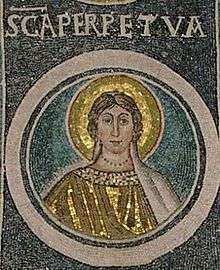Perpetua and Felicity
Perpetua and Felicity (Latin: Perpetua et Felicitas) were Christian martyrs of the 3rd century. Vibia Perpetua was a married noblewoman, said to have been 22 years old at the time of her death, and mother of an infant she was nursing. Felicity, a slave imprisoned with her and pregnant at the time, was martyred with her. They were put to death along with others at Carthage in the Roman province of Africa.
Saints Perpetua and Felicity | |
|---|---|
.jpg) The martyrdom of Perpetua, Felicitas, Revocatus, Saturninus and Secundulus, from the Menologion of Basil II (c. 1000 AD) | |
| Martyrs | |
| Born | c. 182[1] |
| Died | c. 203 Carthage, Roman Province of Africa (modern-day Tunisia) |
| Venerated in | Roman Catholic Church, Eastern Orthodox Churches, Oriental Orthodox Churches, Anglican Communion, Lutheran Church |
| Canonized | Pre-congregation |
| Feast | Roman Catholic Church:
Lutheran Church
|
| Patronage | Mothers, Expectant Mothers, ranchers, butchers, Carthage, Catalonia |
The Passion of Perpetua and Felicity narrates their death.[6][7] According to the passion narrative, a slave named Revocatus, his fellow slave Felicitas, the two free men Saturninus and Secundulus, and Perpetua, who were catechumens – that is, Christians being instructed in the faith but not yet baptized – were arrested and executed at the military games in celebration of the Emperor Septimius Severus's birthday. To this group was added a man named Saturus, who voluntarily went before the magistrate and proclaimed himself a Christian. Perpetua's diary was published posthumously, and has prompted extensive debate on families and gender in early Christianity.
Veneration

In Carthage a magnificent basilica was afterwards erected over the tomb of the martyrs, the Basilica Maiorum, where an ancient inscription bearing the names of Perpetua and Felicitas has been found.
Saints Felicitas and Perpetua (in that order) are among the seven women and eight men commemorated by name in the list of ancient martyrs from the second part of the Canon of the Mass. The Blessed Virgin Mary is commemorated in the first part.
The feast day of Saints Perpetua and Felicitas, 7 March, was celebrated even outside Africa, and is entered in the Philocalian Calendar, the 4th-century calendar of martyrs venerated publicly at Rome. When Saint Thomas Aquinas's feast was inserted into the Roman calendar, for celebration on the same day, the two African saints were thenceforth only commemorated. This was the situation in the Tridentine Calendar established by Pope Pius V, and remained so until the year 1908, when Pope Pius X brought the date for celebrating them forward to 6 March.[8] In the 1969 revision of the General Roman Calendar the feast of Saint Thomas Aquinas was moved, and that of Saints Perpetua and Felicity was restored to their traditional 7 March date.[9]
Other Churches, including the Lutheran Church and the Episcopal Church, commemorate these two martyrs on 7 March, never having altered the date to 6 March. The Anglican Church of Canada, however, historically commemorated them on 6 March (The Book of Common Prayer, 1962), but have since changed to the traditional 7 March date (Book of Alternative Services, 1985).
In the Eastern Orthodox Church the feast day of Saints Perpetua of Carthage and the catechumens Saturus, Revocatus, Saturninus, Secundulus, and Felicitas is February 1.[3][4]
References
- Ellen Salisbury, Joyce (3 March 2019). "Perpetua:: Christian Martyr". Encyclopaedia Britannica. Encyclopædia Britannica, inc. Retrieved 7 July 2019.
- "The Calendar" (PDF). Church of England. Retrieved 11 March 2016.
- Great Synaxaristes: (in Greek) Ἡ Ἁγία Περπέτουα ἡ Μάρτυς καὶ οἱ σὺν αὐτῇ. 1 Φεβρουαρίου. ΜΕΓΑΣ ΣΥΝΑΞΑΡΙΣΤΗΣ.
- Martyr Perpetua, a woman of Carthage. OCA – Feasts and Saints.
- Lutheran Woman Today, Volume 11. Publishing House of Evangelical Lutheran Church in America. 1998.
Perpetua is commemorated by the church on March 7.
- Heffernan, Thomas J. (2012). The passion of Perpetua and Felicity. Oxford: Oxford University Press. doi:10.1093/acprof:osobl/9780199777570.001.0001. ISBN 9780199777570.
- Gold, Barbara K. (2018). Perpetua: athlete of god. Oxford: Oxford University Press. doi:10.1093/oso/9780195385458.001.0001. ISBN 9780195385458.
- "Calendarium", p. 89.
- "Calendarium", p. 119.

